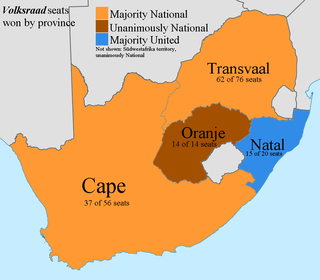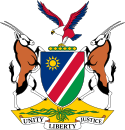
The Parliament of the Republic of South Africa is South Africa's legislature. It is located in Cape Town, the country's legislative capital.

Elections in Angola take place within the framework of a multi-party democracy. The National Assembly is directly elected by voters, while the leader of the party or coalition with the most seats in the National Assembly automatically becomes President.

Elections in Botswana take place within the framework of a multi-party democracy and a parliamentary system. The National Assembly is mostly directly elected, and in turn elects the President and some of its own members. The Ntlo ya Dikgosi is a mixture of appointed, hereditary and indirectly elected members.

The Popular Democratic Movement (PDM) is an amalgamation of political parties in Namibia, registered as one singular party for representation purposes. In coalition with the United Democratic Front, it formed the official opposition in Parliament until the parliamentary elections in 2009. The party currently holds 5 seats in the Namibian National Assembly and one seat in the Namibian National Council and has lost its status as the official opposition party, taking the fourth place. McHenry Venaani is the President of the PDM.

The United National South West Party was a political party in South West Africa, the local counterpart of the South African United Party but founded eight years earlier and merged into the latter in 1971. It was formed through a merger of National Party of South West Africa and the South West Party, in order to counter the influence of the German League in South West Africa. The first congress of UNSWP was held in Windhoek on 1–2 April 1927.

The Parliament of Ghana is the unicameral legislature of Ghana. It consists of 276 members, who are elected for four-year terms in single-seat constituencies using a first-past-the-post voting system.

The National Assembly is the sole legislative body of Botswana's unicameral Parliament, of which consists of the President and the National Assembly. The House passes laws, provides ministers to form Cabinet, and supervises the work of government. It is also responsible for adopting the country's budgets. It is advised by the Ntlo ya Dikgosi, a council of tribal chiefs which is not a house of Parliament.

Elections in Southern Rhodesia were used from 1899 to 1923 to elect part of the Legislative Council and from 1924 to elect the whole of the Legislative Assembly which governed the colony. Since the granting of self-government in 1923, Southern Rhodesia used the Westminster parliamentary system as its basis of government. The Political party that had most of the seats in the Legislative Assembly became the government. The person in charge of this bloc was the Premier, later renamed Prime Minister, who then chose his cabinet from his elected colleagues.

General elections were held in South Africa on 24 April 1974. They were called one year earlier than scheduled by Prime Minister John Vorster on 4 February. The House of Assembly was increased in size from 166 to 171 members. The election was once again won by the National Party, with a slightly increased parliamentary majority.

Parliamentary elections were held for the first time in the territory of South West Africa on 26 May 1926. The German League in South West Africa won eight of the twelve elected seats in the Whites-only election.

Parliamentary elections were held in South West Africa on 3 July 1929. The whites-only election saw a victory for the United National South West Party, which won seven of the twelve elected seats in the Legislative Assembly.

Parliamentary elections were held in South West Africa on 31 October 1934. The whites-only election saw a victory for the United National South West Party, which won eight of the twelve elected seats in the Legislative Assembly.

Parliamentary elections were held in South West Africa on 21 February 1940. The whites-only election saw a victory for the United National South West Party, which won 10 of the 12 elected seats in the Legislative Assembly.

Parliamentary elections were held in South West Africa on 30 August 1950. The whites-only election saw a victory for the National Party of South West Africa, which won 15 of the 18 seats in the Legislative Assembly.

Parliamentary elections were held in South West Africa on 19 May 1945. The whites-only election saw a clean sweep for the United National South West Party, which won all 12 elected seats in the Legislative Assembly.

Parliamentary elections were held in South West Africa on 16 November 1955. The whites-only election again saw victory and an overwhelming majority for the National Party of South West Africa, which won 16 of the 18 seats in the Legislative Assembly.

Parliamentary elections were held in South West Africa on 8 March 1961. The whites-only election saw a victory for the National Party of South West Africa, which won 16 of the 18 seats in the Legislative Assembly, maintaining exactly the number of seats it had won in the previous election. The 1961 polls marked the last time during the apartheid era that any other party won seats.
Rochore Constituency was a constituency in Singapore that existed from 1951 until 1988. The constituency was represented in the Legislative Council from 1951 until 1955, in the Legislative Assembly from 1955 until 1965, and in Parliament from 1965 until 1988. It elected one member of Parliament.

Elections were held in Jonglei State on 10–15 April 2010 as part of the 2010 Sudanese general election, with voting for President of Sudan, National Assembly of Sudan, President of Southern Sudan, Southern Sudan Legislative Assembly, Governor of Jonglei State and the Jonglei State Legislative Assembly. The elections were the first in Sudan for over two decades, held in the aftermath of the 2005 Comprehensive Peace Agreement between the Sudan People's Liberation Movement (SPLM) and the Government of Sudan of Omar al-Bashir. The election was carried out in precarious security conditions, with ethnic conflicts prevalent in the state. The elections were won by the SPLM, with the exception of a handful of seats. Disputes over the election results led to the outbreak of two armed insurgencies.










